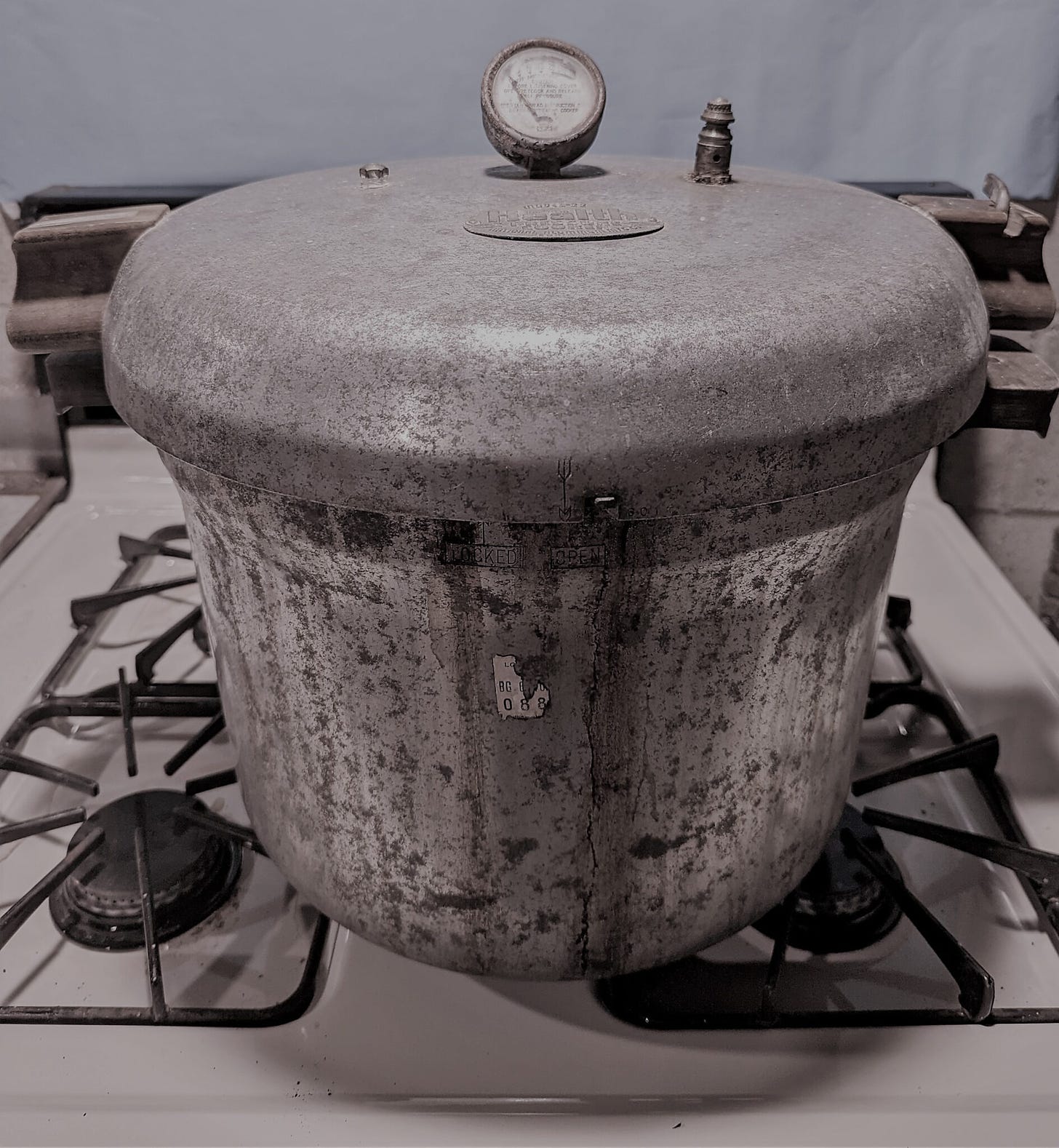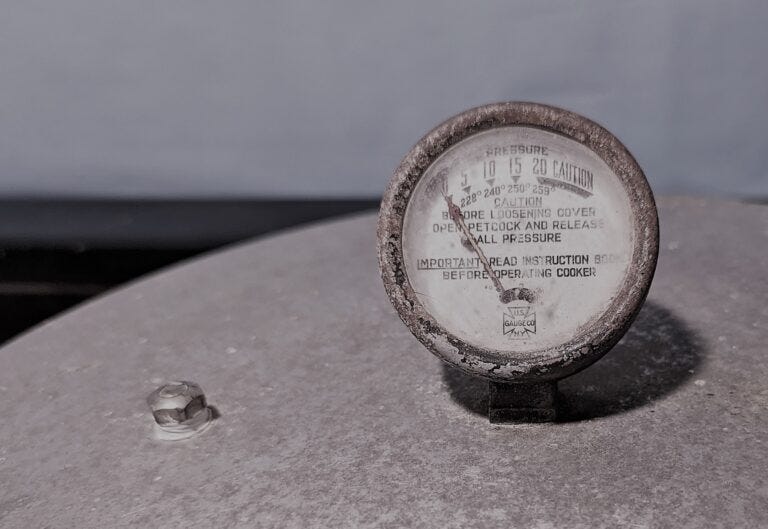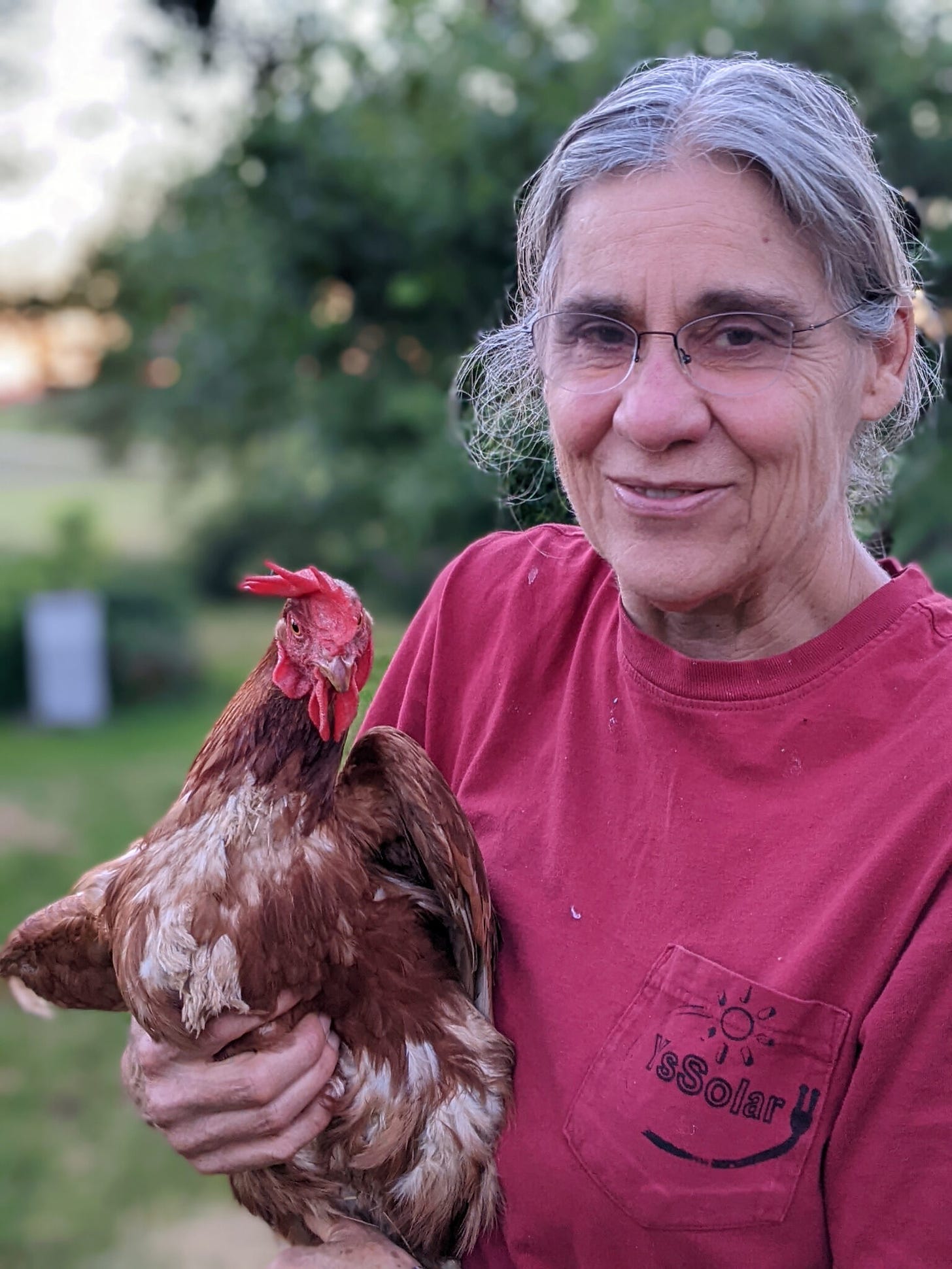The beets were about to explode, steam rising in the pressure canner.
“Stand back,” her mother said. “You never know what’s going to happen.”
Jane Yoder-Short hurried to the darkest corner of the kitchen, her hands over her head and fingers in her ears. Her mother turned the valve, and with a loud whoosh, steam rushed out. If the gasket failed again, the beets would hit the ceiling with a thwack.
In this month’s Blazing Star Journal, Mennonite social activist Jane Yoder-Short writes that she learned at an early age that both pots and people can be precarious. She thought of her family as a pressure canner, ready to explode if the wrong valve was turned.
How did her family blow off steam?
My dad spouted off while doing chores. In the safety of the milking stable, with its line of cows waiting to be milked, he mumbled and shook his head. As he moved the milker from cow to cow, he quietly explained and re-explained the situation. He couldn’t shout. That would scare the cows. He couldn’t confront the person he was upset with, that wouldn’t fit with the Mennonite ideal of kindness.
In contrast, Yoder-Short’s mother vented to a friend on the phone, a party line.
The conversation would begin with calm chatting in English about green beans that needed to be picked and tomatoes that were ripening too slowly. Then, as if a valve had been turned, the chatting switched to Pennsylvania Dutch. The volume went up. The words became sprayed with accents of emotions. . .Ida was the only one on the line who understood this odd dialect.
Yoder-Short never talked to the cows nor to a friend on a party line. She found she could release steam through words on the page. She came home from college one summer to hear about plans for a reservoir in the fields across the road from her family home. A large section of prime farmland would be destroyed. Her letter sparked action. The project was moved to a less fertile location.
Then Yoder-Short married and move to Iowa, only to find that she needed to let off more steam. She read that the Iowa City Press-Citizen sought diverse columnists to add to their Writers Group, a collection of local people who wrote 600-word opinion pieces on a regular schedule. Soon she found herself sitting in George’s Bar with a varied group, sipping a glass of hard cider.
“What’s happening out in the cornfields, Jane?
“Just quiet rumblings and nonstop hog smell.”
Yoder-Short wrote about CAFOs, highly efficient but highly polluting confined animal feeding operations, designed to dump large quantities of hog manure on fields for fertilizer. She wrote about preserving the soil, about taking the land from the Native Americans. She wrote about Rush Limbaugh, asking, “When is something mean-spirited, and when is it said in fun?”
She argued against buying Amish kitsch: ceramic Amish salt and pepper shakers or the small, cast-iron Amish kids on a teeter totter. She argued for Christmas shopping at the resale shops, particularly the Iowa City Crowded Closet where the profits went to the international relief, development and peace work of the Mennonite Central Committee.
Writing became like talking to the cows—words became mixed with the unpleasant smells of the world. Most of the time, people didn’t respond and problems didn’t get solved, but writing gave me hope.
Then as she developed as an op-ed writer, she realized that her readers were more than cows listening to her grumblings. They were people whose experiences had shaped them to think differently.
I was optimistic that as a society we could all care more, all see things we’d overlooked. We could have empathy that reached beyond our borders.
She wrote about military actions, relying on her Mennonite non-violent beliefs, countering society’s embrace of redemptive violence. She wrote about immigration and migrant farmworkers. She wrote about school prayer. She equated pushing prayer on students to forcing them to eat the cafeteria’s Tuesday green bean casserole even when they hated mushrooms.
Her words traveled far. She heard from her daughter in Indiana about her gun control column. She was discussed on a talk radio show in Virginia. Her ideas were debated in a church in Kansas.
Then her own home church toned down a letter she had written in protest of the label “shithole countries.” Yoder-Short argued for welcoming all nationalities, supporting the marginalized, and speaking out against racism. The elders in her church thought the letter too political.
Someone modified the letter to make it kinder and gentler. Yoder-Short signed the letter but not without some mumbling and grumbling.
After the meeting, she went out and let off steam to the night frogs.
Then, with the maturity and perspective she had gained as a political activist and columnist, she persuaded herself to be grateful for the conversations that had happened.
Sometimes red beets end up on ceilings and we learn that letting off steam has to be done carefully. We hope we can learn as we clean up the messes. We hope that making a mess doesn’t prevent us from future attempts at facing explosive situations.
Jane Yoder-Short holds a bachelor’s degree in art and math from Goshen College, a bachelor’s in architecture from the University of Notre Dame, and a master’s in theology and ethics from Anabaptist Mennonite Biblical Seminary.
Jane Yoder-Short joined the Iowa City Press Citizen Writers Group in 2000 and continues to write monthly columns for them. She was a columnist for Mennonite World Review, an Anabaptist publication, from 2010-2020. She is presently working on her memoir, Mennonite Farm Girl Stirs the Pot, A Collection of Untidy Attempts.
Please support my brilliant colleagues at the Iowa Writers Collaborative:
Iowa Writers’ Collaborative Columnists
Laura Belin: Iowa Politics with Laura Belin, Windsor Heights
Doug Burns: The Iowa Mercury, Carroll
Dave Busiek: Dave Busiek on Media, Des Moines
Art Cullen: Art Cullen’s Notebook, Storm Lake
Suzanna de Baca Dispatches from the Heartland, Huxley
Debra Engle: A Whole New World, Madison County
Julie Gammack: Julie Gammack’s Iowa Potluck, Des Moines and Okoboji
Joe Geha: Fern and Joe, Ames
Jody Gifford: Benign Inspiration, West Des Moines
Nik Heftman, The Seven Times, Iowa and California
Beth Hoffman: In the Dirt, Lovilla
Dana James: New Black Iowa, Des Moines
Pat Kinney: View from Cedar Valley, Waterloo
Fern Kupfer: Fern and Joe, Ames
Robert Leonard: Deep Midwest: Politics and Culture, Bussey
Tar Macias: Hola Iowa, Iowa
Kurt Meyer, Showing Up, St. Ansgar
Kyle Munson, Kyle Munson’s Main Street, Des Moines
Jane Nguyen, The Asian Iowan, West Des Moines
John Naughton: My Life, in Color, Des Moines
Chuck Offenburger: Iowa Boy Chuck Offenburger, Jefferson and Des Moines
Barry Piatt: Piatt on Politic Behind the Curtain, Washington, D.C.
Macy Spensley, The Creative Midwesterner, Davenport/Des Moines
Mary Swander: Mary Swander’s Buggy Land, Kalona
Mary Swander: Mary Swander’s Emerging Voices, Kalona
Cheryl Tevis: Unfinished Business, Boone County
Ed Tibbetts: Along the Mississippi, Davenport
Teresa Zilk: Talking Good, Des Moines
To receive a weekly roundup of all Iowa Writers’ Collaborative columnists, sign up here (free): ROUNDUP COLUMN
We are proud to have an alliance with Iowa Capital Dispatch.









Thank you for another fun column to read. Reading this brought back many memories of the party line and the anticipation that was on everyone’s face when the lid came off of the pressure cooker. I had never equated these constants in my childhood to the idea of emotional release. That idea, while it seems obvious, has me smiling when I think of all of the times I saw the smile on my mom’s face and the relief in her eyes when the lid came off and nothing ended up on the ceiling-so to speak!!
Wonderful! I’m not Amish but the column brought back my own memories of pressure cooking canned goods, talking to our dairy cows and living on a party line and to a present life of living with an activist columnist. Thanks, Mary!